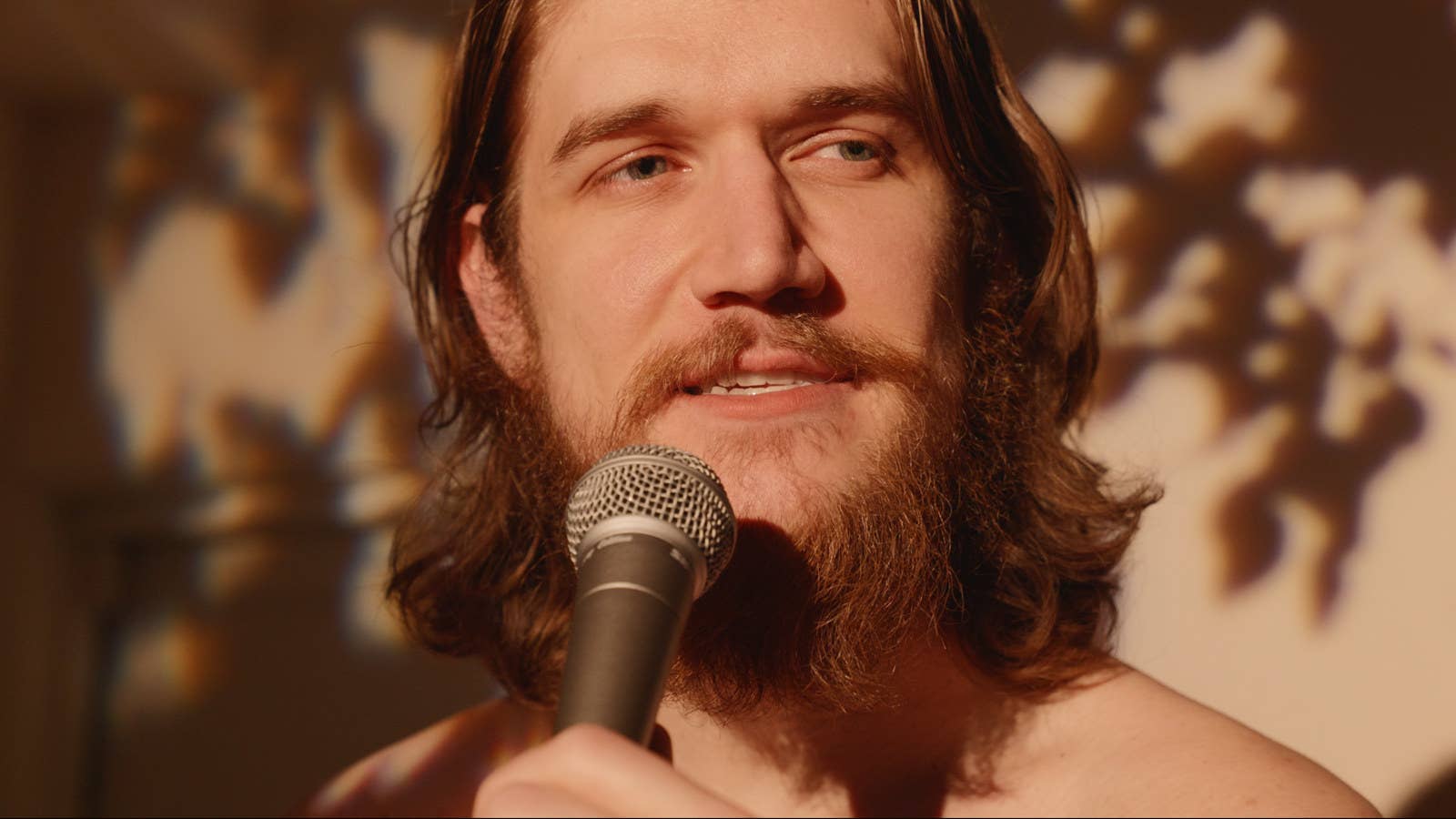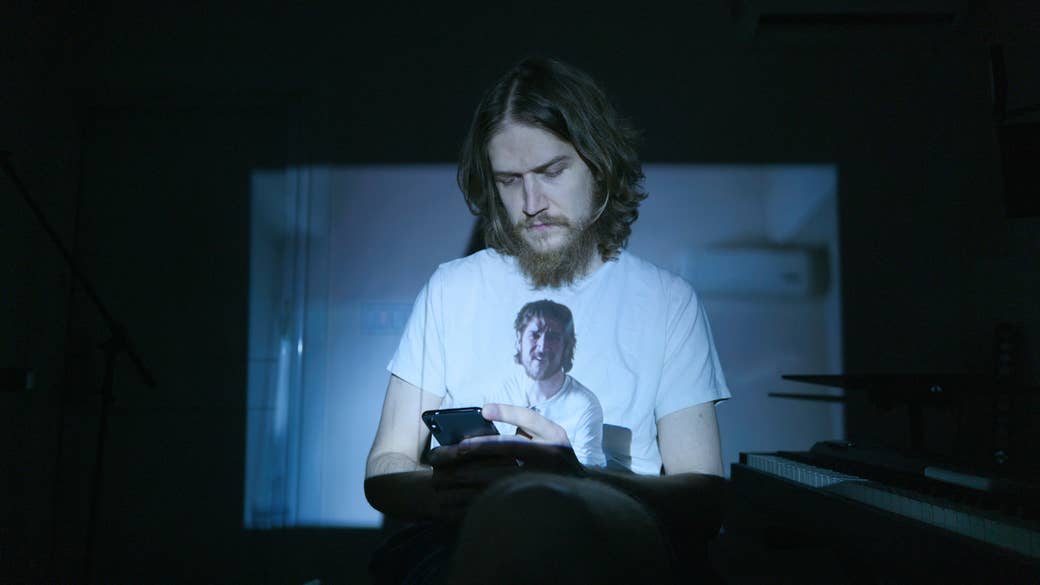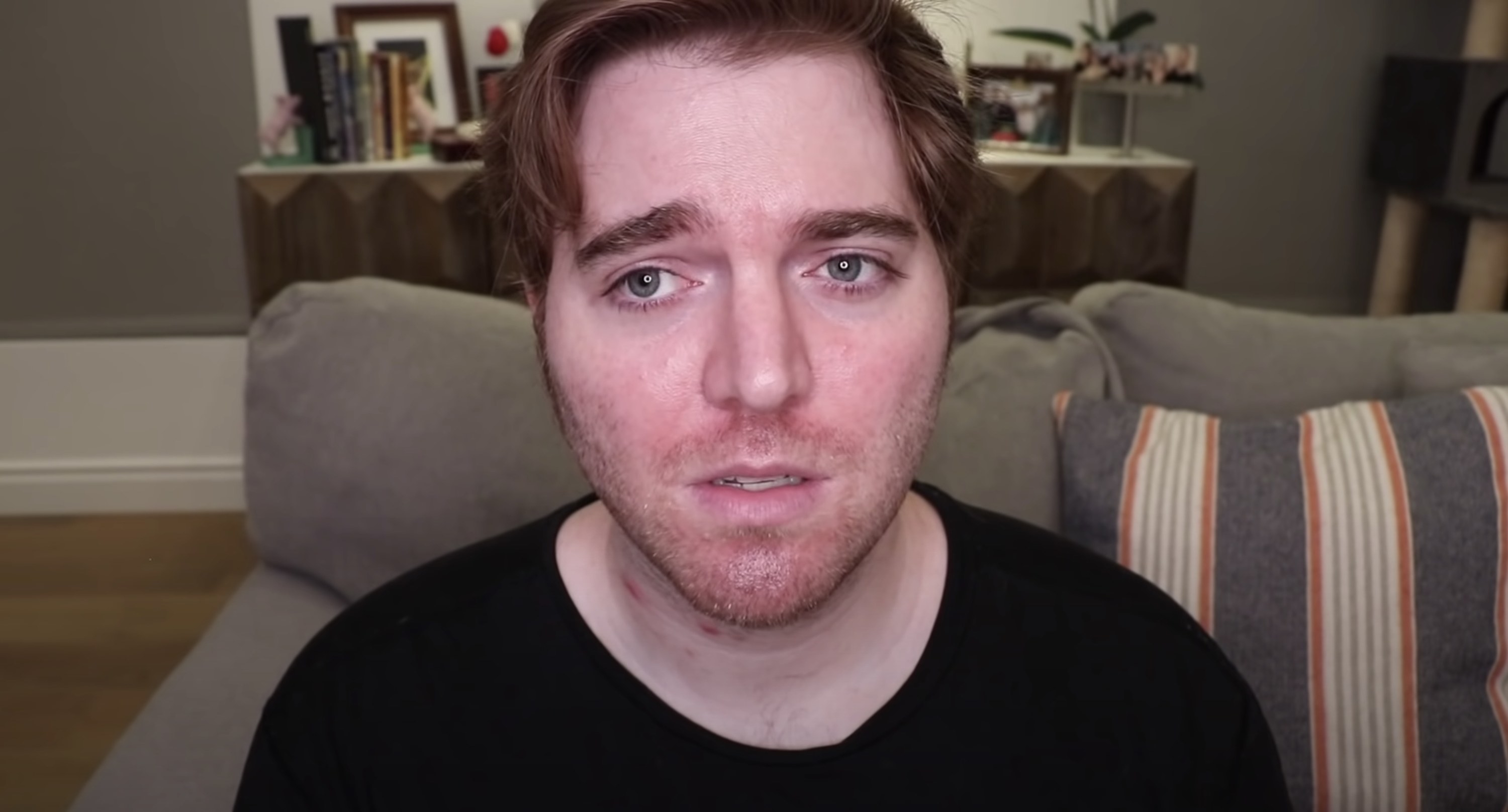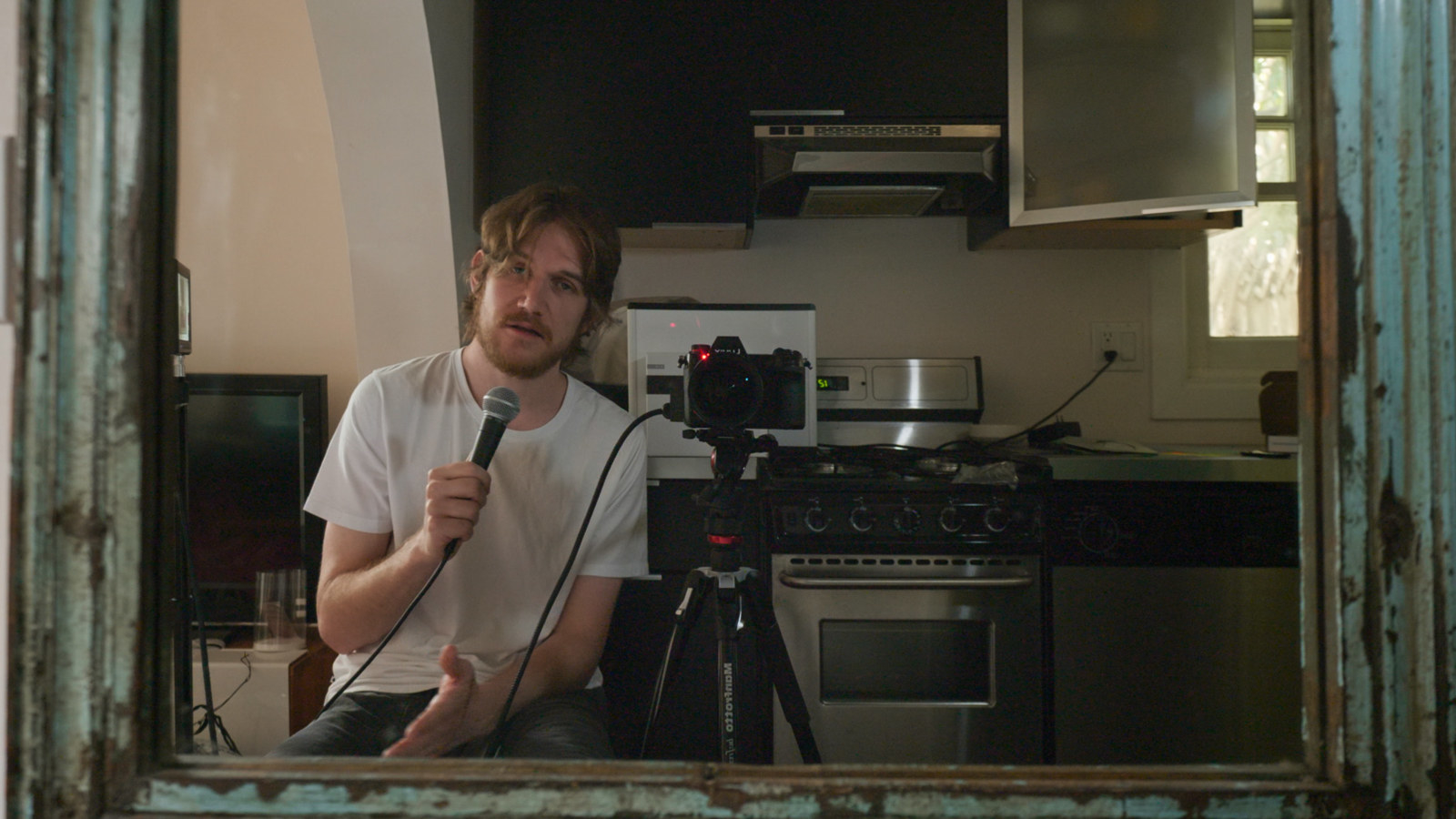
Netflix has categorized Bo Burnham’s latest special, Inside, as a “comedy,” which is outrageous because it’s clearly the horror movie of the year. I don’t know whether anything has scared me as much recently as watching all 90 minutes; it felt like peering into my own rotting core, my hand wrapped around a phone with every single social media app open. Inside has been praised as a rare decent piece of pandemic-inspired entertainment, but it’s also a nightmare about the internet, a tool we can’t escape and all seem to hate.
Inside is Burnham’s fifth special. His first two Weird Al–esque offerings, a 2009 Comedy Central Presents episode and 2010’s Words, Words, Words, relied largely on musical wordplay. 2013’s what. and 2016’s Make Happy started to push in the direction of Inside: he sang more earworms, but the content became a little more political, a bit more bleak, and a lot funnier. (Make Happy’s “Straight White Man” continues to be the best explanation for what, exactly, straight white men want, which is: everything.)
As the title suggests, Inside is shot in a single room in Burnham’s home, and Burnham is the sole writer, director, performer, editor, cinematographer, and musician. After experiencing panic attacks during his last live tour, he had stopped doing live comedy altogether. He was ready to start again in January 2020, but as he says in Inside, “The funniest thing happened.” The special is a cautionary tale about spending so much time online that you lose your sense of self, your mental health reaches a new all-time low (an “ATL,” as Burnham calls it), and you stop being able to relate to people in person. It’s also the natural conclusion of what might happen to your brain if you log on at 16 — as Burnham did, getting his start on YouTube in 2006 with clever songs and self-aware parodies.
The first half of the special offers a few gems that are purely ha-ha funny, as opposed to OK-wow-yikes funny, like the strangely romantic song he sings about FaceTiming with his mother (and screaming at her to take her thumb off the fucking camera). The second half, on the other hand, is like watching someone’s fever dream. ”Welcome to the Internet” made me feel like I had taken a tab of particularly bad acid, while Burnham sang, “Could I interest you in everything, all of the time?” Most of the special is about the internet, from its two brief and goofy odes to Jeff Bezos to the legitimately gutting “That Funny Feeling,” which catalogs all the things that make Burnham feel despair: “Carpool Karaoke, Steve Aoki, Logan Paul / A gift shop at the gun range, a mass shooting at the mall.”

Inside could’ve easily veered into a pretentious rant about the dangers of being online, but what saves it from going off the deep end is Burnham’s self-awareness. He knows the internet can be a poison because it seems to have poisoned him. As a teenager on YouTube, he was wearing tie-dye T-shirts and playing the piano in his bedroom, singing songs about not knowing where the G-spot is. “This guy seems so happy!” wrote one commenter recently on a chipper and upbeat video of a 16-year-old Burnham, adding a brutal coda: “I bet he’ll be super happy when he’s 30.”
“Why do you think Snapchat exists? Why do you think they’d make a company for 13-year-olds where a photo disappears after 24 hours?” Burnham said in 2019 while promoting Eighth Grade, the 2018 film he directed about a teenage aspiring content creator. “There are buildings full of 300 people who are all employed to give children what they want, not what they need.” Whether because of his discomfort with multi-billion-dollar tech companies or a personal desire to refocus, Burnham isn’t really online anymore. Although he was once especially active on not only YouTube, but also on Vine and Instagram, his accounts now do little more than promote whatever he’s releasing.
Burnham has made the transition from internet comedian to successful stand-up mostly by choosing to become less and less online. Plenty of his contemporaries haven’t made, and perhaps have no interest in making, the same transition. YouTubers Shane Dawson and Jenna Marbles both became famous on YouTube around the time Burnham was making his early video content but have taken paths pretty different from his in their adult years. Increasingly, it seems like a life online can only take three routes: the Marbles way (disengaging completely), the Dawson way (engaging so much it blows your life up), or the Burnham way (wanting both to engage and disengage, and feeling dissatisfied either way).
While most people know Dawson as a makeup influencer/conspiracy theory unpacker/YouTube’s Diane Sawyer, he once was a comedian who made act-outs and comedy shorts. He’s practically the poster boy for having your online past come back to haunt you: he’s had to release multiple apologies for racist videos in the last few years. His most recent apology, in June 2020, addressed myriad past controversies — his use of blackface and the n-word in his videos and making sexual jokes about Willow Smith when she was still a minor, among other infractions — but didn’t really win anyone over. He’s been silent since, though there are rumors he’s working on a #FreeBritney documentary.

Despite his many scandals and a wide swath of detractors, Dawson could find an audience should he choose to return. Having become part of an online community, and eventually the leader of his own, he is well aware that the internet is where he holds the most fame and attention. Before Dawson logged off last year, makeup influencer Tati Westbrook said he “manipulated” her into starting a fight online in 2019. He immediately went live on Instagram — while her video was still playing in the background. “I’m losing my mind. I’m losing my mind. This is so fucked,” he said, with around 217,000 people watching. It’s a reckless impulse, even for someone from a generation that has been online since childhood. The internet isn’t fake — it’s real life — but it has commodified conflict and trauma in a way that, as Burnham explores in Inside, is pretty spooky for kids and adults alike.
Marbles became a YouTuber in 2010 and quickly became famous through videos like “How to Trick People into Thinking You’re Good Looking.” That video was an instant classic when I was 19, though it uses a concept that now feels kind of rote: a conventionally attractive white woman puts on makeup while cracking deadpan jokes about how she’s ugly, awkward, and weird. But Marbles, too, was found to have done blackface in the past, and after she apologized, she chose to just get off the machine. “I’m literally just here to have a good time, and I don’t think I’m having a good time,” she said in her 2020 apology video, which has since been deleted.
In the summer of 2020, Marbles ended her podcast, stopped streaming on Twitch, and ceased posting to YouTube. Even her Instagram is dormant. The most information anyone has about her at this point is that she’s staying offline, and that she got engaged a few months ago. Marbles could return to the internet too if she wanted; her apology and immediate self-ejection made her remorse seem sincere. Though fans may miss her, Marbles made the best choice available: she left the internet to try to be a person in the world.
It’s not just comedians and other professional creators who make content for the internet — we all do, sometimes unwittingly, and the burnout from that churn is real. Burnham still has the urge to create something, and releasing a special on Netflix with almost no promotion and no interviews is as analog as it gets for someone with his background. He’s still in the ambivalent position of knowing that being online all the time is a recipe for emotional distress but still wanting to participate, just on new terms. In Inside, he never quite gets to answering why he still makes internet-friendly content, but he had to have known he was feeding the machine. TikTok has been showing me nothing but teenagers dancing and singing along to songs from the special all week. It feels inevitable, but isn’t this also exactly what he fears?

Burnham has continued to make art, though of a more socially conscious flavor than in the past, and he’s clearly wary of the companies and infrastructures that got him the audience he still has. After his first Jeff Bezos song (“Bezos I”), Burnham lies on the ground under a blanket, his head and microphone propped up on a pillow. “Maybe the flattening of the entire subjective human experience into a lifeless exchange of value that benefits nobody except for a handful of bug-eyed salamanders in Silicon Valley, maybe that, as a way of life, forever, maybe that’s not good,” he says. “I’m horny.” Later, in an interlude, Burnham sourly watches projected footage of himself as a teenager, glaring at this kid who doesn’t know what the internet is about to do to his mental health. At 30, he’s now warning Gen Z about their inevitable future: “Well, your fucking phones are poisoning your minds, okay, so when you develop a disassociative mental disorder in your late twenties, don’t come crawling back to me.”
Inside is a warning to other artists and creators: The internet is fun until it isn’t, and when that happens, you can decide to sink in deeper, growing obsessed with intangible, often toxic communities that profit from conflict, or you can leave and try to have a life elsewhere, outside as opposed to in. Nearly half an hour into the special, Burnham sits on a stool like one might during a traditional stand-up set. But there’s no audience, no laugh track. “Is it necessary that every single person on this planet expresses every single opinion that they have on every single thing that occurs all at the same time?” he asks. “Can anyone, any single one, can anyone shut the fuck up about anything, any single thing? Can any single person shut the fuck up about any single thing for an hour? Is that possible?”
Burnham seems aware of the irony of him not shutting up about anything for an hour and a half, but maybe that’s the point: It’s an impossible request. It’s human nature to want to be heard, and the internet has amplified our voices, sometimes for the better, but often for the worse. Now, it’s up to us to recognize when the world has heard enough. Burnham knows it better than anyone: No one really wants to shut the fuck up. ●
